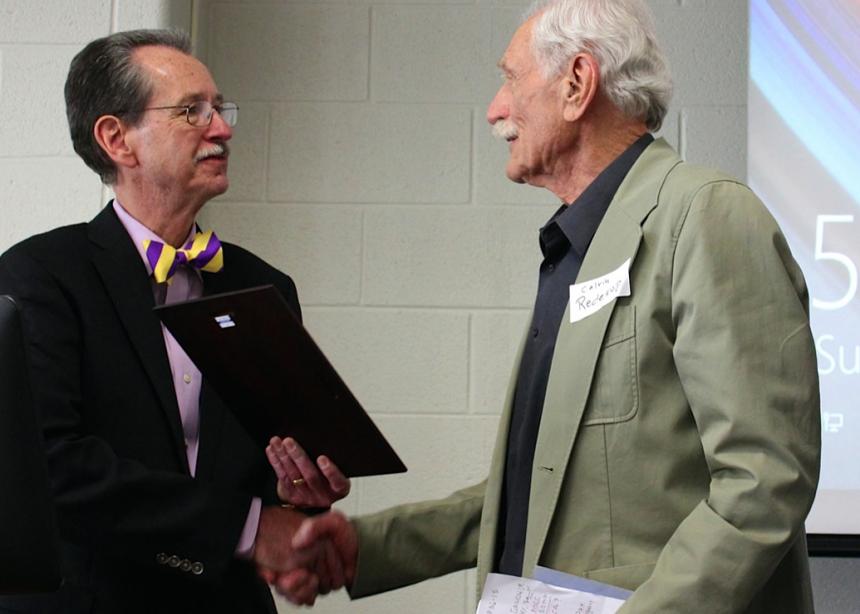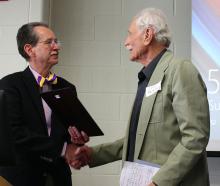In 1951, Jay “Junior” Lehman, then a 21-year-old farm boy from Ohio, sailed by freighter to Antwerp, Belgium. He was among the first wave of conscientious objectors to participate in a new alternative service program called Pax. Reaching their eventual destination in Germany, Lehman and about 20 draft-age men labored to turn Nazi poison-gas bunkers into housing for World War II refugees.
In late April, Lehman, now 85, made another trip—not quite so far—from his home in Ohio to James Madison University (JMU) in Harrisonburg, Virginia, where he and nearly 60 other “Paxers,” including organization co-founder and former leader Cal Redekop, received a community service award from JMU’s Mahatma Gandhi Center for Global Nonviolence.
Pax, a program of Mennonite Central Committee (MCC), was created in response to the reinstatement of the military draft in the United States after the start of the Korean War. Mennonites, Quakers, Brethren and other conscientious objectors could perform alternative service in Europe, and later in Africa and South America. Pax continued until 1975, three years after the draft ended. By the time the program closed, nearly 1,200 young Americans, and some Canadians, had served in 40 countries.
An ‘influential’ program
Nearly 300 people packed a reception hall at JMU to celebrate the organization’s legacy. Terry Beitzel, director of the Mahatma Gandhi Center, noted that Pax was receiving only the fourth award in the centre’s 10-year history. The centre gives a global nonviolence award, which has been presented to former President Jimmy Carter and first lady Rosalynn Carter and South African anti-apartheid leader Desmond Tutu, and also the community service award, past co-recipients of which include restorative justice pioneer Howard Zehr, a professor at Eastern Mennonite University (EMU), and JMU nursing professor Vida Huber.
“Pax was chosen for the award because of its contribution to establishing alternative service programs and influencing the formation of the U.S. Peace Corps, but primarily because of the emphasis on service to others,” said Beitzel, who has taken courses and taught at EMU’s Center for Justice and Peacebuilding and earned a PhD in conflict analysis and resolution from George Mason University.
“Pax serves as an example of service and peacemaking for all of us today,” said JMU Provost Jerry Benson.
Redekop, now 89 and living in Harrisonburg, accepted the award on behalf of Pax and its volunteers.
“I’m only the handmaiden for Pax or handlanger—German for lackey,” he said, before calling up Ann Graber Hershberger ‘76, who chairs the MCC U.S. board. Hershberger, a nursing professor at EMU, spoke of the Pax legacy and how it affected her own MCC work, with husband Jim ‘82, in Central America.
‘Paxers’ still connected
Redekop and Paul Peachey dreamed up the new organization while the two were in Europe serving in post-war relief efforts with MCC. (Both Peachey, who eventually taught at EMU, and Redekop went on to academic careers in the field of sociology. Redekop is also a former business executive who has written widely on Christian ethics in business.)
Inspired by the Latin word for peace, the Pax program began in Europe with housing projects for war refugees, including German-speaking Mennonites from Ukraine, who were caught between the German and Soviet armies. Redekop, raised in the Midwest in an immigrant community of German-speaking Mennonites from Russia, was able to communicate in the low-German dialect.
The cultural exchange between Paxers and the people they helped was rich and rewarding. Lowell E. Bender, current MCC board member and the evening’s master of ceremonies, was a Pax worker in Germany, Austria and Greece from 1961-63, where he witnessed the long-term devastation caused by the war while constructing new houses for families whose homes had been destroyed years before. Bender came back to the United States after his service and enrolled at EMU.
“We were all changed by our experiences,” he said, of the Paxers.
“Many of the Pax veterans still stay in touch with the people they served,” says Ervie Glick, whose interest in the German language and culture began with his Pax tour and eventually led to a teaching career as a German language professor (he retired from EMU in 2004). Reunions of the Salzburg Paxers, the unit Glick served in, have been held nine times since 1970, including once in Salzburg, Austria.
Paul M. Harnish, of Doylestown, Pennsylvania, visited a large, modern chicken processing co-op that he helped start years ago in an impoverished area of Greece. His little hatchery began with 500 chicks imported from the United States. Harnish remembers his delivery being complicated by the need to spend the night in a hotel with the chicks before he could return to the village.
The history of the Pax program is featured in two books: Urie Bender’s Soldiers of Compassion (1969) and Cal Redekop’s The Pax Story: Service in the Name of Christ (2001). (Redekop’s book is available through CommonWord.) A 2008 award-winning documentary Pax Service: An Alternative to War was produced by Burton Buller, Cal Redekop, and Albert Keim. (A segment of the documentary can be seen on YouTube and the entire video can be ordered from MennoMedia.)



Add new comment
Canadian Mennonite invites comments and encourages constructive discussion about our content. Actual full names (first and last) are required. Comments are moderated and may be edited. They will not appear online until approved and will be posted during business hours. Some comments may be reproduced in print.